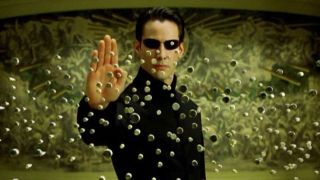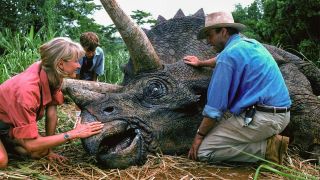Ernest Cline reveals how his "unfilmable book" - Ready Player One - finally became a blockbuster
Author Ernest Cline talks us through the journey his debut novel took to become a big blockbuster
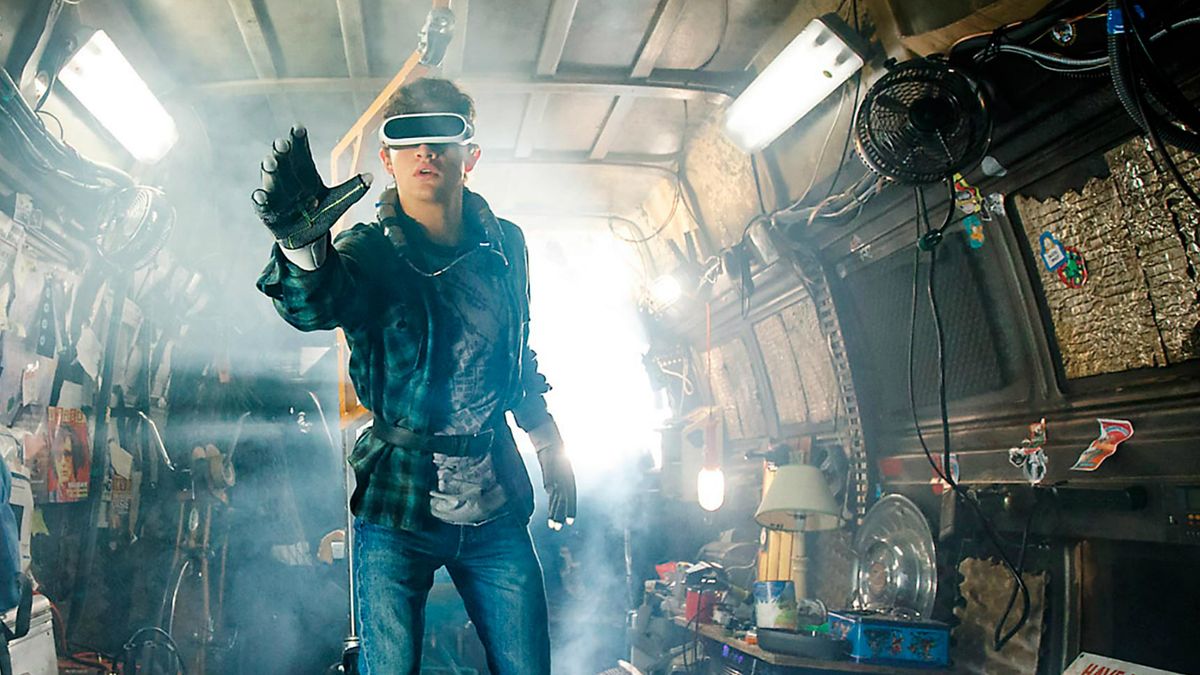
In case there was any doubt, Ernest Cline is a massive geek. Ready Player One is an ode to some of the nerdiest (and best) movies, video games, and more from the ‘80s and beyond, and its author is every inch the fanboy you’d expect him to be. What’s clear when I sit down to talk to him about his book being turned into a movie, is that he’s just really into geek culture and wrote a book about everything he loved growing up. He still can’t believe his story about a young boy from Oklahoma, who cares more about a virtual world than the one he was born into, is being turned into a huge blockbuster. Much less by Steven Spielberg! It would be a dream come true for any author, but for Cline it feels like more than that. It feels a little bit like fate.
“Ready Player One would have been a different story - and I might not have written it at all - if I hadn’t grown up watching Steven [Spielberg]’s movies.” He tells me. “I was kinda obsessed with ET. I was the same age as Elliott when the movie came out and I was also the child of a broken home and I really connected to that story.” His Spielberg obsession didn’t stop there though - Close Encounters, Raiders of the Lost Ark, and The Goonies were all big influences on Cline and he’s not embarrassed to admit it. “Ready Player One is very much a sci-fi version of The Goonies,” he says. “Steven came up with that story - it’s based on his childhood dreams - and so that was the kind of story I was trying to write with RPO. And the guy who inspired me to write it ended up being the one to make it, so it’s just almost too perfect. It’s been three years since he signed on and I’m still pinching myself.”
It would be a while, though, before the author got to work with one of his childhood heroes. When he first wrote RPO, Cline wasn’t even sure if it could be turned into a movie. “I assumed the whole time I was writing it it could never be a movie because of the way in which I wanted to mash up pop culture and pay tribute to all the different facets of pop culture that I loved.” Cline tells me. “That was freeing to me, as a writer, I didn’t have to worry about budget or casting, or the possibility of it ever getting made as a movie, so I could just let my imagination run wild.” But the day after he sold his book, Warner Bros. snapped up the film rights: “There ended up being a bidding war over my weird book about the ‘80s, and Pacman, and virtual reality that set off a bidding war in Hollywood!” He remembers in disbelief. “My family and I were still reeling from selling the book to Random House when the next day they sold the film rights to Warner Bros. with me attached to write the screenplay. It suddenly became my job to turn my unfilmable book, that I’d just written, into a movie - and I had to do it before the book was published.”
It might sound like Cline had written himself into a nightmare project, but he was in a better position than most authors to adapt his novel for the screen. “I had started out as a screenwriter,” he says. “So because I was already a produced screenwriter who was in the Guild - and the author of the novel - then it was not outrageous for me to demand that I got to write the first few drafts of the screenplay.” That didn’t mean he could do whatever he wanted though: “After I wrote my drafts then they [the studio] ended up hiring another writer who would change all the things that I’d refuse to change [laughs], and it moved it even further away from the book.” At one point the studio even wanted Cline to remove all the ‘80s references (yes, really!): “I wrote my drafts of the screenplay before the book came out, so I couldn’t even point to it being a bestseller, or much less an international bestseller, so I didn’t have as much leverage to kind of maintain things.” Thankfully, Warner Bros. came around once the book became a hit: “It wasn’t until the book kind of caught on and became a success the studio, I feel like, became more invested in remaining faithful to the book.”
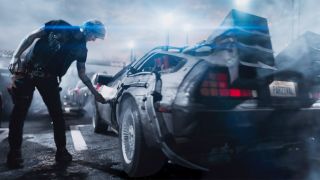
Still, Cline knew the story couldn’t remain exactly the same as in the book. He had written Ready Player One with no limitations in mind and knew that certain elements would need to be changed for the movie: “All the challenges that I had that were somebody standing in a classic video game, like Pacman, or Tempest, or re-enacting a Dungeons and Dragons module is great geeky fun, and works in a book, but in a movie that would alienate a big chunk of the audience who had never played the game. I knew things like that would have to be changed up and be made into challenges that were more cinematic.” Plus, Cline still believed that the studio would struggle getting the rights to a lot of the references in the book. As it turns out, Spielberg would go a long way to solving both of these problems…
The issues over rights turned out to be much more manageable than Cline originally anticipated. “The example I always use of what I hoped would happen with RPO if it became a movie was Who Framed Roger Rabbit because they got the rights to all these different animated characters and mashed them up together into one movie, and that was Steven Spielberg who made that happen [he was a producer].” Cline goes on: “The very same thing played out 30-years-later with RPO where everybody who was asked was excited to have their character in a Steven Spielberg movie. If it had been anyone else…”
Cline set about bringing the screenplay back closer to the original story with the help of friend and screenwriter Zak Penn, and Spielberg joined in. “It still just makes my heart sing to hear him talk about how much he enjoyed [RPO],” Cline gushes. “He came into his first meetings with a dog-eared copy of the paperback, filled with post-it notes and highlighted passages of things that he wanted to put back in the movie, and it was that way all the way through the rest of the screenplay development and on the production.” And Cline knew that together they could work on the things which would need to be changed: “All good film adaptations depart from the source material considerably because cinema has different needs than a book. Steven has one of the best track records ever with book-to-film adaptations, like Jaws and Jurassic Park, so I knew I was in good hands.”
Sign up to the SFX Newsletter
Get sneak previews, exclusive competitions and details of special events each month!
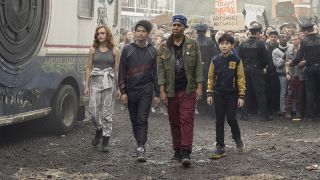
Fans of the book will know - and mild spoilers for the movie here - that two out of three of Halliday's challenges were changed for the film, but Cline is adamant that the new challenges are in “the spirit of what’s in the book but more cinematic”. Another major difference is that the High Five meet in real life much sooner in the film than they do in the book to make for a faster paced story, and this also necessitated some character changes, mainly for Artemis. “I feel like her character is the one who benefits the most from the film adaptation,” says Cline. “Because I always wanted her to be a strong independent female hero who was just as smart, if not smarter than the male characters and figure things out before them... And I feel like that’s in there with the [book] story, but it’s harder to achieve because it’s all from Wade’s perspective.” By changing the perspective for the film, the other characters were able to do more, which emphasised the novel’s message about working together. Cline even thinks it makes his story better: “All the themes that work together maybe in the background in the book are brought more to the forefront [in the movie] and I think make for a richer storytelling experience. I think anybody who watches the movie and then read the book would find more of what they loved in the movie.”
Surely there are some changes which Cline isn’t as happy about though? “I’m so happy with this movie, I wouldn’t change a frame of it,” he assures me. “[But] the one thing initially that I was really bummed about was Ultraman, who was a Japanese superhero that I grew up watching when I was a kid and he plays a big role in the end battle in the book, and Steven was all on board to use Ultraman, he dug Ultraman too, but at the point where we asked for the rights the company in Japan, Tsuburaya, who owns Ultraman was having a legal battle with another company over the foreign distribution rights to Ultraman. And both of them wanted Steven to use Ultraman because they knew that would just make the character more popular, but because of the legal battle none of them could clear a chain of title in time to use him in the movie. I was crestfallen because it was just bad timing.”
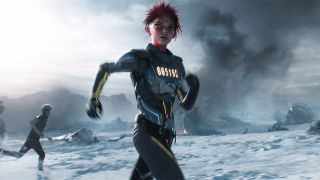
This again turned out to be a blessing in disguise because it meant that they needed to make more of the Iron Giant in the movie, which is only mentioned in passing in the book. Cline included the character in his novel in tribute to one of the film’s screenwriters who he knows, but when it came to making more of the character in the film, everyone was onboard. “Warner Bros. owns The Iron Giant, and Steven loves The Iron Giant, and so did Zac, and so everybody loved the idea,” he says. “And the role grew into The Iron Giant playing a big role in the movie. That makes me so happy because when The Iron Giant film came out it was not a big hit, people discovered it on video and it was not well advertised and so Tim [McCanlies] and Brad Bird, they never had the experience that they’re having now of seeing people freak out over The Iron Giant and people have a connection to it and it’s a lot of people’s biggest reaction in the [RPO] trailers.”
But that’s not all. It seems like the production of Ready Player One was just as full of Easter eggs as the book: “And the crazy other thing about The Iron Giant is that it’s inspired by Steven Spielberg as well,” Cline says. “You know the ambling nature of that story Tim has told me was partly inspired by ET. In The Iron Giant, [Hogarth] finds this creature in the forest and he leaves a trail of pieces of metal back to his house, which is what Elliott does in ET, but with Reese’s Pieces. So there’s a very amblin-esque nature to The Iron Giant, so I feel like it was already celebrating Spielberg a little bit. And now he’s returning the favour.”
And the happy coincidences didn’t stop there. While Cline didn’t have any input on casting he says he couldn’t be happier with the actors who got to work on the movie, especially Simon Pegg, who plays Halliday’s partner Ogden Morrow. “Another person who inspired me to become a storyteller and a filmmaker!” he exclaims. “Spaced is referenced in RPO because that was one of my favourite TV shows, and was some of the first storytelling I ever saw where they used pop culture all throughout.” Ever the fan, he geeked out with Pegg about his appearance in the movie recently: “I told Simon... ‘I feel like somehow by writing this book that celebrates all the people who inspired me and all the things that I love, I somehow ended up getting to work with you and Steven and the very people who [made me want to become a writer]’.” I told you it sounded like fate.
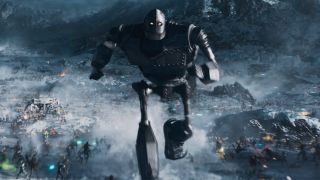
When all was said and done and the film was finished - “even during editing and he [Spielberg] took notes. I said ‘Oh hey, Artemis uses this gun from Aliens in this one scene and it doesn’t sound quite right like it does in Aliens’” - what does it feel like seeing your weird book about the ‘80s, and Pacman, and virtual reality up on the big screen? “I made him show it to me twice!” Clines says. “I was like, ‘Can I see that again?’ Because I feel like I was so visually overwhelmed the first time although I’d seen a lot of it in pieces, seeing it altogether, the first time I’d seen it all together he showed it to me twice in a row. I loved it both times and saw new things each time. It’s that kinda movie, the first time you finish watching it, for me anyway, you want to watch it again right away because he fills every frame with so much action and information and story that I just wanted to see it again right away.” But nothing topped watching the film in Cline’s hometown of Austin, Texas at SXSW: “It takes me back to going to see movies when I was a kid, and there aren’t too many movies like this that are just fun, action, escapist, pure adventure with so much heart and lack of cynicism.” Even with his debut novel made into a big blockbuster by one of the best filmmakers in the world, Ernest Cline is still chasing his childhood.
Delve deeper into the world of Ready Player One as the cast reveal their favourite Easter eggs (and the ones they had to Google).
Lauren O'Callaghan is the former Entertainment Editor of 12DOVE. You'd typically find Lauren writing features and reviews about the latest and greatest in pop culture and entertainment, and assisting the teams at Total Film and SFX to bring their excellent content onto 12DOVE. Lauren is now the digital marketing manager at the National Trust.
Most Popular

